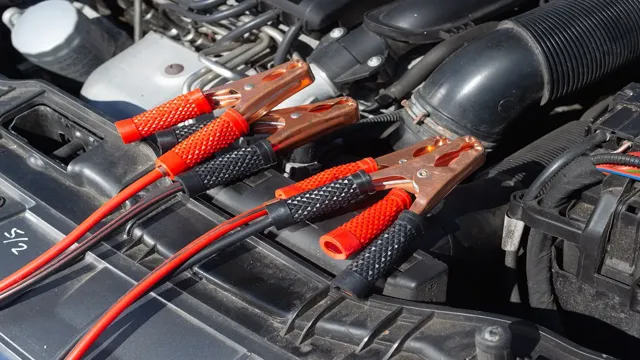What Voltage Does a Car Battery Charger Put Out? Expert Tips and Recommendations

Do you own a car? If you do, you know how frustrating it can be when your car battery dies. It always seems to happen at the worst possible moment. If you have ever experienced this, then you know why it is important to have a good car battery charger.
But, with so many different chargers on the market, it can be confusing to know what charger to choose. One important factor to consider is the voltage of the charger. In this blog post, we will talk about the importance of car battery charger voltage and how to choose the right charger for your car.
So, sit back, grab a cup of coffee, and let’s dive in!
Introduction
If you’re wondering what voltage a car battery charger puts out, the answer is generally around 12 volts. However, it’s important to note that there are different types of car battery chargers, each with their own specifications. Some may put out slightly more or less voltage, or have the ability to adjust the voltage based on your specific battery’s needs.
It’s important to choose the right charger for your vehicle, as using the wrong one can potentially damage your battery or electrical system. A good rule of thumb is to consult your vehicle’s manual or a professional to ensure you’re using the correct charger and voltage for your specific vehicle.
What is a Car Battery Charger and How Does it Work?
A car battery charger is a device that is used to charge and maintain the battery in your car. It works by supplying the battery with the necessary electrical energy to recharge it. The charger has a transformer that changes the household AC into a lower voltage DC supply, which is then used to recharge the battery.
The charger is connected to the battery through a set of cables with positive and negative clamps that are attached to the battery’s terminals. It is important to choose the appropriate charger for your car’s battery to ensure that it charges correctly. The chargers may vary in voltage, amperage, and charging time, depending on the type of battery you have.
In general, charging a car battery takes several hours, and the charger will automatically shut off when the battery is fully charged. By regularly using a car battery charger, you can avoid being stranded with a dead battery, prolong the battery’s life and ensure that your car starts smoothly each day.

Importance of Voltage in Car Battery Charging
The importance of voltage in car battery charging cannot be overstated. A car battery is the lifeblood of your vehicle, supplying power to the starter motor and the electrical components. The battery voltage is crucial for charging the battery, as it determines the current flow required to replenish the battery’s charge.
The voltage regulators in your car’s charging system ensure that the battery is charged at the correct voltage, ensuring its longevity. Inadequate voltage can cause damage to the battery, resulting in a shorter lifespan and leading to expensive repairs. Therefore, it is essential to maintain proper voltage levels when charging your car’s battery to keep it in good working order.
Understanding Car Battery Charger Voltage
If you’re wondering what voltage does a car battery charger put out, the answer isn’t always straightforward. Car battery chargers typically range from 6 volts to 12 volts, but there are also chargers that can operate at a higher voltage level. The specific voltage output will depend on the type of charger you have and the size of the battery you are trying to charge.
When selecting a car battery charger, it’s important to choose one that matches the voltage level of your battery. Otherwise, you risk damaging your battery or even the charger itself. It’s also essential to pay attention to amperage, as this will affect the charging time.
If you’re unsure what charger is right for your car battery, it’s always best to consult the user manual or seek advice from a professional.
Types of Car Battery Chargers
When it comes to understanding car battery charger voltage, it’s essential to know that different types of chargers supply different voltage levels. A standard car battery typically requires 12 volts to recharge efficiently. However, certain types of batteries, such as deep cycle batteries, may require a higher voltage level.
The charger voltage should match the battery voltage, or it can cause damage to the battery or even pose a safety risk. Always check the battery’s recommended voltage before selecting a charger voltage. It’s also crucial to choose a charger with the correct amperage for your battery; too much or too little amperage can affect the battery’s charging time and lifespan.
In summary, understanding the voltage requirements for your car battery charger is crucial for the health and longevity of your vehicle’s battery.
Voltage Range of Car Battery Chargers
When it comes to charging a car battery, it’s important to understand the voltage range of the charger you’re using. Generally, car battery chargers come in two voltage ranges: 6-12 volts and 12-24 volts. The range you choose will depend on the type of car you have and the voltage required by your battery.
If your car has a standard 12-volt battery, then a charger in the 6-12 volt range will work just fine. However, if you have a heavy-duty truck or equipment with a 24-volt battery, you’ll need a charger that can handle the higher voltage range. It’s crucial to use the right charger to avoid damaging your battery or causing a safety hazard.
So, before you plug in your charger, make sure you know the voltage range that’s appropriate for your car battery.
How to Check the Voltage of a Car Battery Charger?
Car battery charger voltage Car battery chargers are essential for keeping your car’s battery in good condition. Understanding car battery charger voltage is important to ensure the charger is working correctly and that your car’s battery is receiving the correct amount of charge. The voltage output of a car battery charger typically ranges from 6 to 24 volts.
To check the voltage of your car battery charger, you will need a voltmeter. First, make sure the charger is turned off, and then connect the voltmeter to the charger’s output terminals. Turn the charger on and check the voltmeter to see the charger’s voltage output.
If the voltage output is too low, the charger may not be charging your car’s battery effectively. If the voltage output is too high, it could damage your car’s battery. By understanding and checking the voltage of your car battery charger, you can ensure that you are maintaining your car’s battery and extending its lifespan.
Conclusion
In conclusion, the voltage output of a car battery charger depends on the specific model and brand, but generally ranges between 12 and 14 volts. However, if you’re looking for a witty and clever explanation, think of it this way: it’s enough juice to power up your car battery, but not enough to electrocute yourself like a squirrel on a power line. So, charge your battery with confidence and leave the risky voltage business to the daredevils!”
FAQs
What is the average voltage output of a car battery charger?
The average voltage output of a car battery charger is typically between 12 and 14 volts.
How do I know when my car battery is fully charged?
Most car battery chargers have a built-in mechanism to indicate when the battery is fully charged, such as a green light or audio signal.
Can a car battery be charged while still in the vehicle?
Yes, a car battery can be charged while still in the vehicle using a compatible car battery charger.
How long does it take to fully charge a car battery with a charger?
The time it takes to fully charge a car battery with a charger can vary depending on the charger and the size of the battery, but it typically takes several hours.
Is it safe to leave a car battery charger connected overnight?
It is generally safe to leave a car battery charger connected overnight, but it is important to read the manufacturer’s instructions and follow any recommended safety precautions.
Can a car battery charger damage the battery if left connected too long?
Yes, a car battery charger can damage the battery if left connected for too long, so it is important to monitor the charging process and disconnect the charger once the battery is fully charged.
What are some common causes of car battery failure?
Some common causes of car battery failure include age, extreme temperatures, corrosion, and leaving lights or accessories on when the vehicle is turned off.



